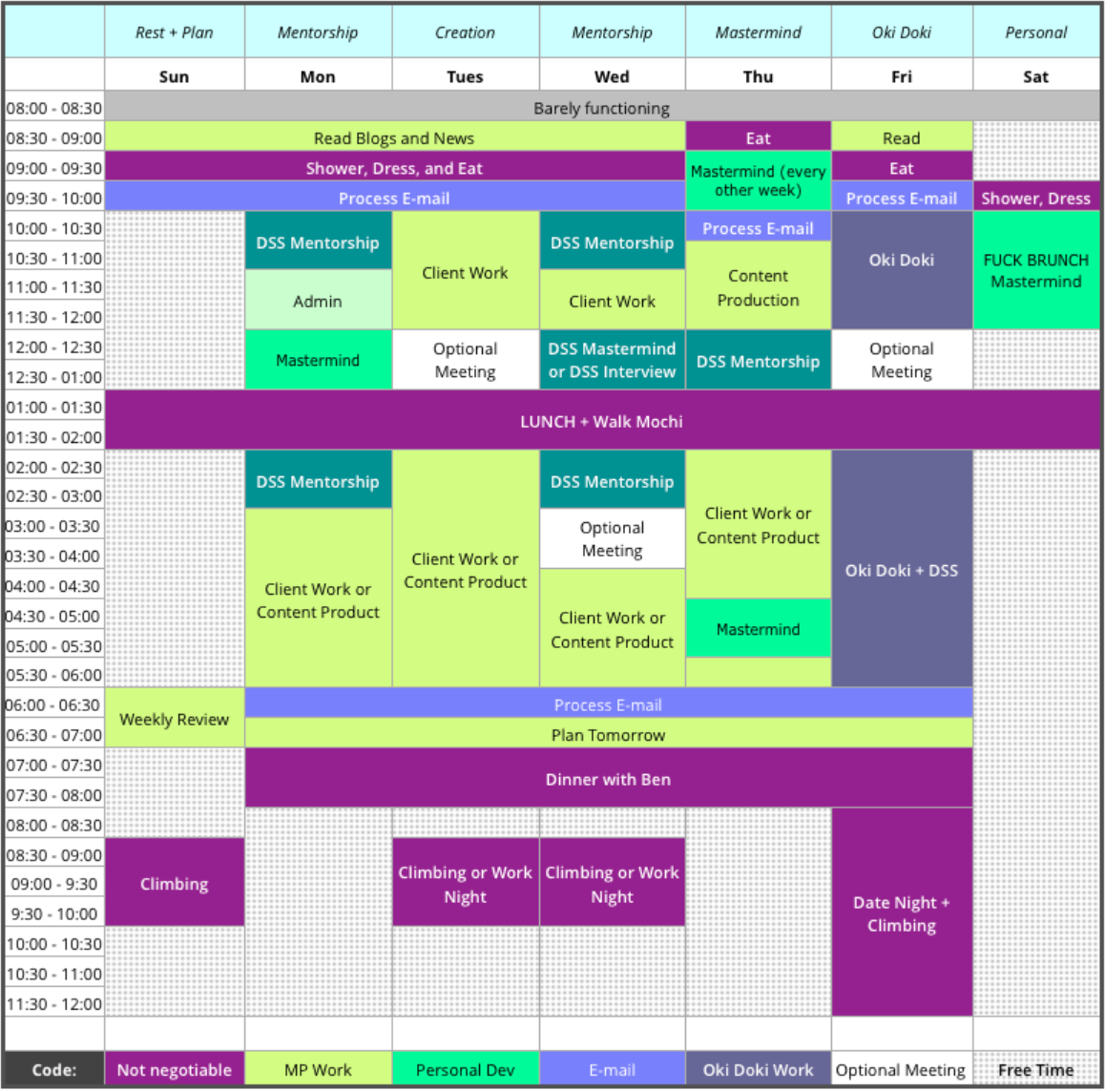In 2015 I wrote a post about how designing your ideal week could help you save your sanity. I talked about how I was theming my days as a way to create more margin and spaciousness in my life, and to my surprise, the article went viral. It became one of my most popular posts, and made its way onto Medium’s top picks for the week.
You can read the original article here.
At the time of writing the post, I’d been planning a week ahead of my schedule for about a year, but I wasn’t sticking to the schedule I had set out for myself and I always felt busy.
My ideal schedule had become more of a pipe dream, and I was operating in reaction mode all the time.
What I knew about myself then — and is still true today — is that structure gives me flexibility, and I do best when I can create that structure for myself in advance. That may stress some people out, but I know it’s what allows me to be proactive, so I set out to figure out why my best intentions were falling flat week after week.
Nearly eight years later (!) I thought it might be interesting to take a look at what has changed since I first wrote that post, and what has remained the same.
To summarize the gist of the original article:
Most of us are way over-booked and we leave little to no margin whatsoever in our calendars. As a result we spend most of our days feeling guilty or ashamed that we’re not getting done all of the things we intended to do, which further exacerbates our ability to get things done.
One of the key strategies for overcoming this challenge? Decide in advance how you want to spend your days, and create a system that holds you accountable to that.
All humans suffer from the cognitive bias of planning fallacy: we under-estimate how long things take, how much they’ll cost, and the risks involved. We also don’t account for obstacles, delays, or challenges that might arise.
Please know that I say “we” very intentionally — so if you feel personally attacked please know that you are definitely not alone; this is a well-known phenomena. 🙋🏻♀️
So how do we take back control of our schedule?
That’s the question I’ve come back to over and over since writing that original post.
The first thing I was struck by as I was reflecting on the original post is how much the concepts and principles have endured, while it was mostly the tech and execution that have evolved.
The original Themes spreadsheet:

Since publishing that post:
- I’ve moved from living in the city to buying a house in a small rural area.
- I’ve gone through multiple business iterations, going from solopreneur to a full-time team of three plus contractors.
- My business model and services are completely different.
- Our team adopted a 4-day work-week.
- I studied permaculture and got my Permaculture Design Certificate.
My hobbies, environment, and business models may have changed… but theming my days has remained a powerful anchor.
The specific Themes themselves have shifted slightly as my business has changed, but it’s interesting to note what still works:
Still the Same
- Mondays are still mostly administrative
- No work planned before 10am
- Short end of day reviews (“Daily meeze”)
- Dedicated timeblocks for checking email
- I start with non-negotiables like physical activity and meal time
- Fridays are for me (creativity, ideation, personal development, etc.)
Different
- I don’t have 1:1 client work anymore; Client Work and Mentorship is now Teaching/Creating
- I spend more time on content creation + curriculum development (deep work time)
- I generally don’t work in the evenings anymore
- Fridays are essentially “buffer” days with no scheduled work or obligations, but are available to handle overflow from the week (aka, margin)
- Weekly reviews on Friday afternoon, weekly planning on Sundays
- My themes are deeply integrated into my task management system (in *Notion!)
I’ve used pen and paper, whiteboards, spreadsheets, Google calendar, and just about every other digital tool out there before I settled on Notion — and it has been the most supportive system yet.
My theming system is now so deeply integrated into my productivity system and journaling process, that it completely removes decision fatigue and overwhelm.
By deciding in advance what I want to focus on each day, Notion helps me see only what I need to see from day to day.
I can assign specific projects to specific days of the week, and any tasks relating to those projects won’t show by default unless I want them to show. This helps me stay focused day to day, and gives me a chance to get into the zone.
How I work with my Themes today:

Some other things that have worked to help reign in the schedule:
- Lowering expectations of my output (yes, really).
- Practicing that “No” muscle: (every yes means no to something else). Sometimes I cancel things because the reality of my schedule hits me after the fact.
- Accommodate for small buffer blocks every day, and ideally have one week day that has a longer dedicated buffer block for overflow/unplanned work.
- Routinely revisit your commitments: What are you deeply committed to? What needs to take a back seat to make sure that you meet your commitments?
- Accountability. Having a team means I’m now accountable to others too, so all new project commitments are agreed upon together!
But remember: It’s not about following my approach exactly. It’s about finding what works for YOU.
The structure I’ve been able to create in Notion helps with my (lack of 🐿) discipline, and sets up the conditions I need to focus.
Thanks to my theming and the support of my team, I can actually make time for the the things I want to do — like inspire more people to design their day on purpose, and create a life that they don’t feel the need to escape from.
Are you interested in identifying your own ideal week so you can narrow the gap between your ideal week and reality? Check out my Capacity Planning workshop!
[*For full disclosure, I’m a *Notion Partner, so when you sign up with my link, you also help support me and my content!]



Leave a Reply